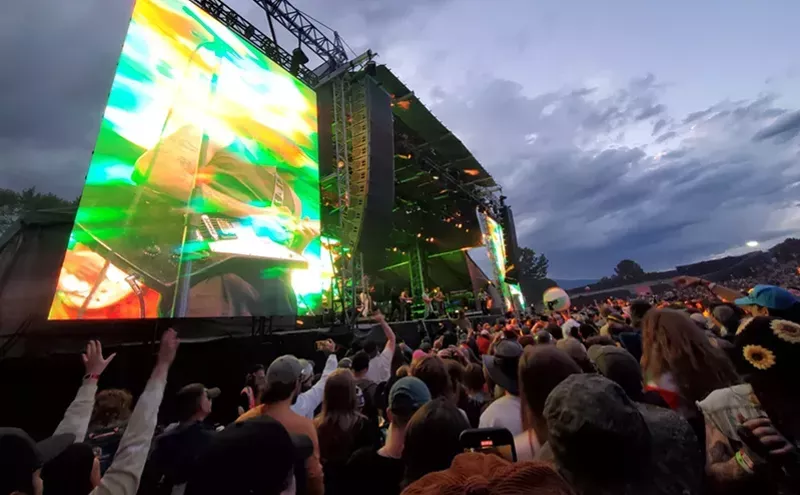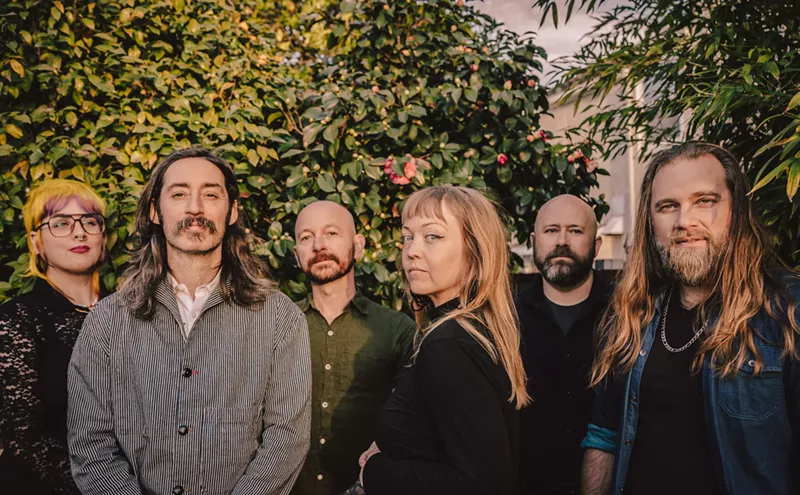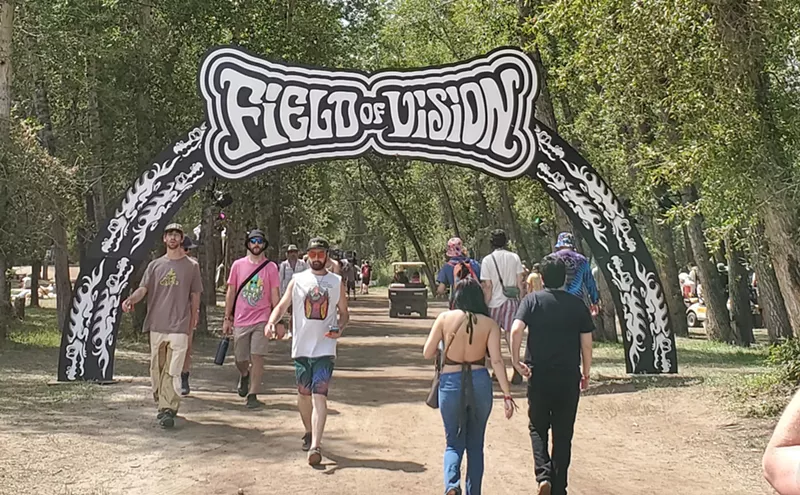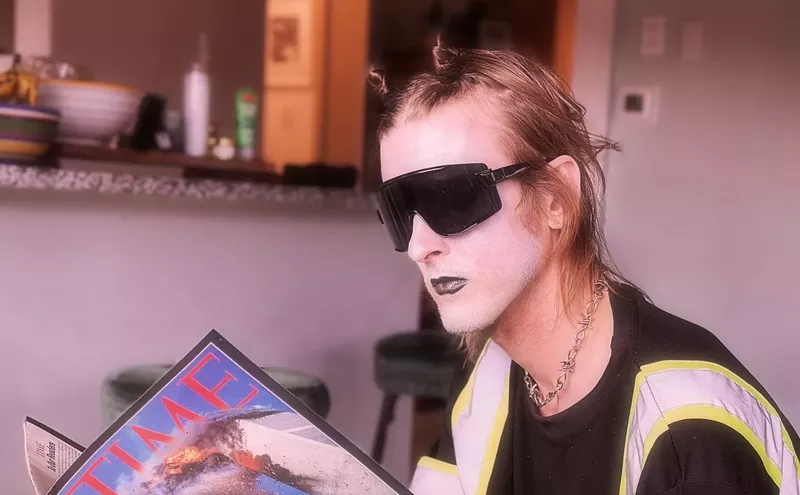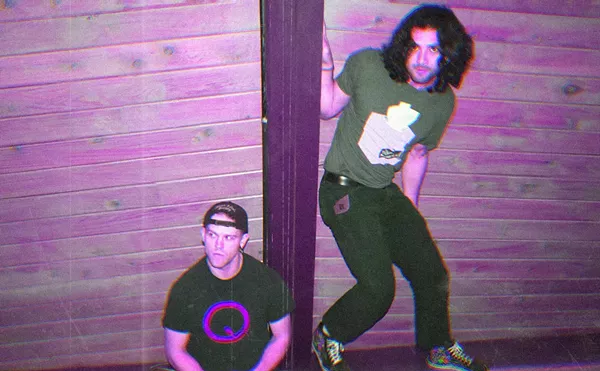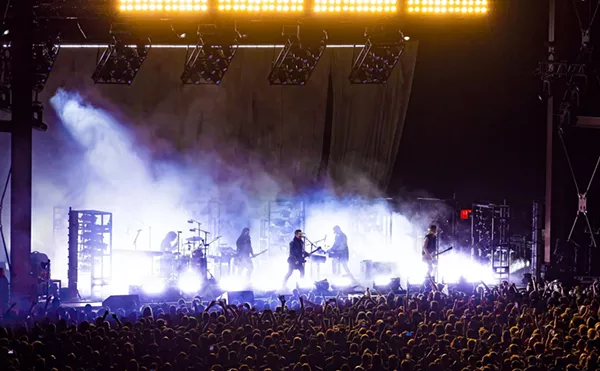For three and a half years, the Jimi Austin was one of Fort Collins's most celebrated acts —and that whole time, there was tension brewing within the band. Frontman Chris Anderson wanted to explore a more laid-back approach to songwriting, while guitarist Ian Haygood and drummer Shane Zweygardt were pushing for a more progressive sound.
"I feel like you can hear it in the Jimi Austin songs," Haygood notes. "It was kind of conflicting directions, where you've got this singer-songwriter dude and then you've got a couple of guys who really want to rock behind him. I think that we all learned a lot in that band, and it was a great experience. I was glad all of it happened."
The tension was relieved when Anderson headed to Africa with his then-fiancé, who had joined the Peace Corps; the move led to the Jimi Austin's calling it quits. Anderson eventually returned and formed Fierce Bad Rabbit, while Haygood and Zweygardt formed Wire Faces with bassist Darren McFarland six months after the Jimi Austin parted ways.
"We came out of it and went the direction that Shane and I had initially intended to go," says Haygood. "It's cool, because it's like there are no compromises. We just do whatever the fuck we want. It's perfect. We're not fighting about every song. It doesn't take us months and months to put a song together because everyone's ego is involved. Things just seem to happen a little bit easier in this band, especially being a three-piece. I really like the three-piece."
When the trio first started out, Haygood says, they didn't have a super-specific sound in mind. "Ultimately we just wanted to keep it upbeat and really kind of powerful and energetic," he explains. "We want people to dance and have a good time. We want it to be fun. I think that was the initial goal: Just play fun, upbeat, energetic rock and roll in our own way, our own interpretation of it, but stay experimental and be as weird as possible when you can."
Drawing on everything from kraut-rock pioneers Can and the Police (Zweygardt's fierce and precise drumming recalls Stewart Copeland's) as well as At the Drive-In and Mars Volta, Wire Faces creates the sort of post-punk that ends up sounding like Gang of Four meets Fugazi. The influences are readily apparent on the band's new self-titled album, due out on the Bocumast imprint this week.
The trio, now with new bassist Menyus Borocz on board, spent the last six months recording the album in three separate recording studios — with Brian Gerhard at Audio Loom (formerly Helmet Room) in Denver and Jason Larson at Backbone and Pig Pen Studios in Loveland.
"It was kind of an experiment," Haygood says of working in the different studios. "We wanted to get different sounds from different people. It ended up being quite the fucking nightmare because we were switching platforms; we went from Cubase to Pro Tools. It wasn't pretty. Some major tracks got lost. It was kind of a grueling process, but it was a lot of fun, and it gave us a lot of time to experiment with different ideas and different sounds."
The tunes got a little edgier once Haygood and company started working on the tracks in the studio. "As we were recording, a different sort of energy was developing," he says. "We hadn't really done any recording before as a band. We did one recording with our previous bassist, Darren. We hadn't really recorded with Menyus yet. It was like the three of us together; I think it got a little edgier and a little more aggressive. But I like it. I like the attitude."
The album's powerful opener, "Count to Three," undoubtedly has that attitude, in addition to some string parts composed by Borocz, who has a music degree from the University of Northern Colorado. Cellist Martina Grbac from Matson Jones plays on that cut, as well as on "Robbery."
Zweygardt's drumming kicks off "Two Ton Satellite," which began as a riff in the studio. "Shane just kind of played it out and we recorded it and we just sort of built a song around it," Haygood recalls. "I actually really like the way that turned out, and that was the one that had the least amount of thought put into it. We just kind of cracked it out."
Since the band has been together for about a year — about half of that with Borocz — Wire Faces is gradually getting more comfortable improvising within the songs in a live setting.
"A lot of times what we do now is prolong intros and outros or something, or just do something weird on the spot," Haygood points out. "As far as messing around within the songs, I think we're just getting a little more comfortable doing that. It takes time getting to know ourselves as players.
"Obviously, Shane and I know each other really well," he adds, "but putting Menyus in the mix was a totally different thing than playing with Darren. It's not that we're not open to changing things live; it's just coming around slowly. But that's the plan. We're all big into improvising."
While Wire Faces' new album is solid all the way through, it's live where the act really shines, as evidenced by its recent performance at the FoCoMx, a Northern Colorado music showcase sponsored by the Fort Collins Music Association. "There was a line out the door the whole time we were playing." Haygood says. "It was totally packed, and there were windows behind us where we were playing. I just kept seeing people that I knew in line who kept flipping me off because they couldn't get in."
Haygood moved to Denver from Fort Collins about a year ago, while Borocz and Zweygardt are still living up north. The band is trying to have a presence in both cities, which means a lot of driving for Haygood, who drives the hour and a half up north at least once a week for rehearsal, maybe two or three times if they're prepping for a big show.
"But it's cool," he says. "It's totally worth it for me. I really give a shit about it, and I really want to make it work. I feel really lucky to be playing with Shane and Menyus. I'm not trying to waste anybody's time.
"When we were in the studio," he goes on, "I was driving like crazy. I'd basically be at work or in the studio or practicing. I work in Denver and was driving back and forth, like, every day. I put some major miles on my car during the making of the album, that's for sure."



